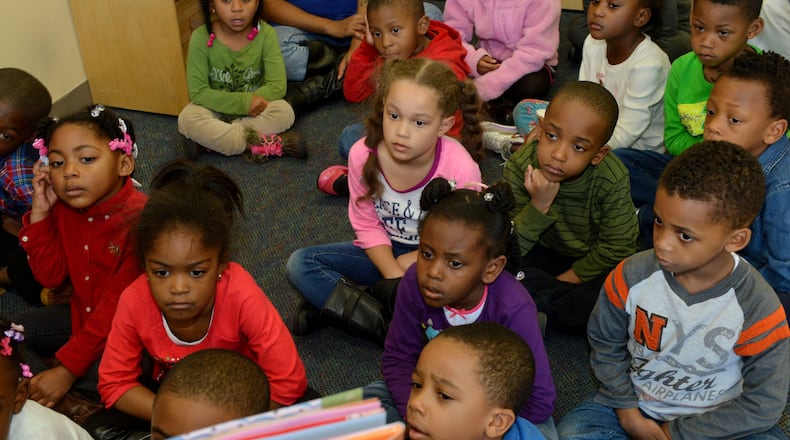In a guest column, state Sen. Michelle Au, D-Johns Creek, applauds the push by President Joe Biden for universial pre-K.
In his first formal address to Congress five days ago, Biden said, “The great universities in this country have conducted studies over the last 10 years. It shows that adding two years of universal, high-quality preschool for every 3-year-old and 4-year-old, no matter what background they come from, puts them in the position of being able to compete all the way through 12 years and increases exponentially their prospect of graduating and going on beyond graduation.”
Investments in early childhood programs not only improve outcomes for the children who participate but for Georgia and the nation as a whole, says Au.
By Dr. Michelle Au
Perhaps the most surprising thing about President Biden’s call for universal pre-K in his American Families Plan is that anyone is surprised at all. Universal pre-K — that is to say, broad access to quality preschool education — is the norm in most wealthy nations.
And that is because these nations realize what the United States should have realized long ago: that early childhood education can lead to improvements in both short and long-term health-related outcomes in our kids.
We tend to think about health framed by factors most proximate to the delivery of healthcare itself. Insurance, interventions, medications, therapies. Yet it is the larger environmental issues—factors those in the public health sphere call the “social determinants” of health—that have far more impact on a community’s well-being than any care delivered at the bedside.
Credit: TheCOLCollection
Credit: TheCOLCollection
These factors include access to quality education opportunities, availability of community-based resources, and the ability to meet daily needs, all which universal early childhood education could provide, particularly for lower income working families.
Most early childhood education programs serve two primary purposes. The first is to provide cognitive, social, and behavioral support for children in an effort to prepare them for kindergarten. The second is to facilitate the ability for parents to participate in the work force by providing care for children while they work. High quality early childhood education has been shown to show improvement along both of these metrics. The Journal of Economic Perspectives in even noted, rather dispassionately, that quality early childhood education programs “constitute worthy social investments in the human capital of children.”
Yet over the past five decades, the United States’ investment in early childhood education has decreased relative to that of other wealthy nations. This gap is most pronounced in our public programs which tend to enroll low-income children, and only a fraction of those eligible, due to limited funds.
Ironically, some Republicans have stood against proposals for a national universal pre-K program despite its benefits, historically branding such measures as profligate spending and government overreach. These same Republicans, meanwhile, wholeheartedly endorse measures like work requirements for low-income parents to qualify for programs like Medicaid, essentially requiring low-income mothers to work without providing them a safe place to leave their children.
In his joint address to Congress last week, President Biden unveiled his bold and progressive American Families Plan, which, in addition to a slate of other measures targeted at supporting parents and children, included plans to provide preschool for every 3- and 4-year-old child in the United States. This is aimed toward closing the gap in access to high-quality early childhood education for low-income children and facilitating increased participation of their parents in the work force.
Unsurprisingly, and sometimes bizarrely, Republicans cried foul.
The night of the president’s address, Sen, Marsha Blackburn, R-Tenn., tweeted, “You know who else liked universal day care[?]” with a link to what she presumed to be a damning New York Times article from 1974 describing the Soviet Union’s highly subsidized broadly available day-care system. The article, in fact, reads like a paean to universal early childhood care. “The vast majority of Soviet families require a working wife to make ends meet,” the article states, and that working class women are “delighted to have nurseries and kindergartens,” while “providing the children with the beginnings of an education.”
The day afterward, “Hillbilly Elegy” author and possible Ohio Senate hopeful J.D. Vance tweeted, even more perplexingly, that universal pre-K would be “a massive subsidy to the lifestyle preferences of the affluent over the preferences of the middle and working class” and therefore constitute “class war against normal people.”
The presumption implicit in both Sen. Blackburn and Mr. Vance’s protestations is quite simply that “normal” working class people should not, would not, choose to eschew stay-at-home parenting over paid work outside the home.
Meanwhile, the reality is that fewer low-income parents avail themselves of high-quality preschool simply because availability and resources are so limited, and much like the Soviet families described in The New York Times article shared by Senator Blackburn, most low to middle-class American families cannot subsist on a single salary.
Furthermore, in states where universal pre-K programs exist, they are both successful and wildly popular. Georgians, especially, should know as our universal pre-K program was the first of its kind in the nation, and now enrolls almost 60% of Georgia’s 4-year-olds, with resultant improvements in their school readiness along a wide range of measures. Still, Georgia’s early childhood education program leaves out most 3-year-olds, and waiting lists exist, particularly in metro Atlanta and Savannah. Ours is seen as a model success, and a start, but we as a country could do more.
Partisan posturing aside, the American Families Plan, and the universal early childhood education proposal at the heart of it, is an investment in this country’s future. It is an investment in our children, it is an investment in the parents who raise them, and it is an investment in the health of our communities.
And as with many public health interventions, the benefits far outweigh the costs. In this moment, those benefits are ones we can’t afford to overlook.
About the Author
The Latest
Featured



